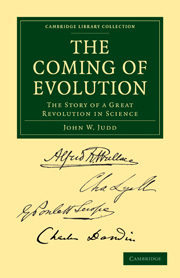Book contents
- Frontmatter
- Contents
- CHAP. I Introductory
- CHAP. II Origin of the Idea of Evolution
- CHAP. III The Development of the Idea of Evolution to the Inorganic World
- CHAP. IV The Triumph of Catastrophism over Evolution
- CHAP. V The Revolt Scrope and Lyell against Catastrophism
- CHAP. VI The Principles of Geology
- CHAP. VII The Influence of Lyell's Works
- CHAP. VIII Early Attempts to establish the Doctrine of Evolution for the Organic World
- CHAP. IX Darwin and Wallace: The Theory of Natural Selection
- CHAP. X The Origin of Species
- CHAP. XI The Influence of Drawin's Works
- CHAP. XII The Place of Lyell and Darwin in History
- Notes
- Index
- Plate section
CHAP. VIII - Early Attempts to establish the Doctrine of Evolution for the Organic World
Published online by Cambridge University Press: 07 September 2010
- Frontmatter
- Contents
- CHAP. I Introductory
- CHAP. II Origin of the Idea of Evolution
- CHAP. III The Development of the Idea of Evolution to the Inorganic World
- CHAP. IV The Triumph of Catastrophism over Evolution
- CHAP. V The Revolt Scrope and Lyell against Catastrophism
- CHAP. VI The Principles of Geology
- CHAP. VII The Influence of Lyell's Works
- CHAP. VIII Early Attempts to establish the Doctrine of Evolution for the Organic World
- CHAP. IX Darwin and Wallace: The Theory of Natural Selection
- CHAP. X The Origin of Species
- CHAP. XI The Influence of Drawin's Works
- CHAP. XII The Place of Lyell and Darwin in History
- Notes
- Index
- Plate section
Summary
In studying the history of Evolutionary ideas, it is necessary to keep in mind that there are two perfectly distinct lines of thought, the origin and development of which have to be considered.
First. The conviction that species are not immutable, but that, by some means or other, new forms of life are derived from pre-existing ones.
Secondly. The conception of some process or processes, by which this change of old forms into new ones may be explained.
Buffon, Kant, Goethe, and many other philosophic thinkers, have been more or less firmly persuaded of the truth of the first of these propositions ; and even Linnaeus himself was ready to make admissions in this direction. It was impossible for anyone who was convinced of the truth of the doctrine of continuity or evolution in the inorganic world, to avoid the speculation that the same arguments by which the truth of that doctrine was maintained must apply also to the organic world.
Hence we find that directly the Principles of Geology was published, thinkers, like Sedgwick and Whewell, at once taxed Lyell with holding that ‘the creation of new species is going on at the present day,’ and Lyell replied to the latter:—
‘It was impossible, I think, for anyone to read my work and not to perceive that my notion of uniformity in the existing causes of change always implied that they must for ever produce an endless variety of effects, both in the animate and inanimate world.’
- Type
- Chapter
- Information
- The Coming of EvolutionThe Story of a Great Revolution in Science, pp. 82 - 94Publisher: Cambridge University PressPrint publication year: 2009First published in: 1910



